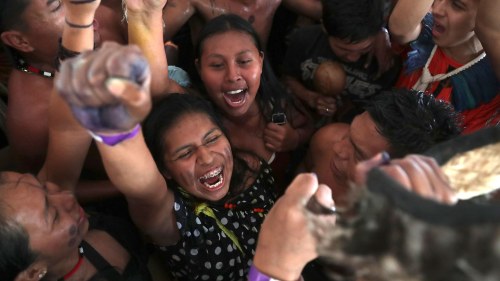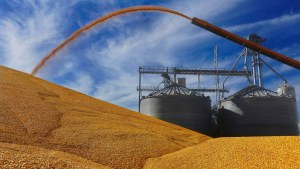Protecting Indigenous Land, Super Food, and Big Food Emissions
Check out our roundup of the week's top news and research in food, agriculture, and global development.

Top Story
US-Mexico Corn Dispute Continues
Researchers in Mexico are making progress in developing non-genetically modified (non-GM) yellow corn seeds to replace US corn imports. The goal is to develop enough non-GM seed varieties to replace approximately 6 million metric tons of the 18 million metric tons of corn Mexico imports from the United States, raising serious concerns from the United States on what the future of corn trade will look like. To learn more about the GM corn dispute, check out this Global Food for Thought blog.
 Food and Agriculture
Food and Agriculture
Council Insights
Moving Forward
“To make this change, we don’t need to wait for others,” said Francesca DeBiase during our webinar on sustainable food seals. “Let’s get a group together, let’s kick this off. I don’t know of a better organization than the Chicago Council...to actually start taking action and moving this forward and focusing on progress over perfection.”
Food and Agriculture
South African Fires
Devastating fires in regions of South Africa have resulted in agricultural losses including crops, livestock, and infrastructure damage. Approximately 1.2 million hectares of land have been affected by the ongoing fires. The fires compound existing challenges for farmers, including load shedding, infrastructure deterioration, rising costs, and rural safety concerns, leaving them with an estimated $13 billion in debt.
Caribbean Heat
Record-breaking heatwaves in the Caribbean, exacerbated by climate change and El Niño, pose a severe threat to regional food security. The extreme temperatures affect soil quality, water availability, worker productivity, food prices, and trade, impacting major crops, fish stocks, and livestock. The region's heavy reliance on rainwater for irrigation worsens the situation, with up to 88 percent of crops depending on it.
Protecting Indigenous Land
A majority of Brazil's Supreme Court voted against a cut-off date for Indigenous land claims known as the marco temporal (time limit). The farm lobby sought this deadline to restrict Indigenous land rights to areas they inhabited in 1988, but the court ruled that the deadline was unconstitutional. Brazil has 1.6 million Indigenous people, half of whom live on ancestral lands important for preserving their cultures and languages, particularly in the Amazon and farming regions.
Deeper Dive
What Are the Implications of Mexico’s GM Corn Ban?
Mexico's efforts to produce more non-GM yellow corn seeds to replace imports from the United States have significant implications for both the United States and the world. Mexico's plan to limit the use of GM corn for human consumption challenges the US corn industry's exports and could impact its agricultural trade with Mexico. Additionally, this move aligns with a global trend towards non-GM agriculture, potentially influencing other countries to adopt similar practices.
Resilience
Super Food
Plant breeders around the world are working to develop more climate-resilient produce in the face of rising temperatures and declining water availability. Developed through gene-editing and existing seed banks, these new varieties of fruits and vegetables include cauliflower that can stand intense sun, melons that need less watering because of their deeper root systems, and heat-tolerant potatoes.
DC Report
Imminent Shutdown
If Congress is unable to reach a spending agreement by September 30, the government will shut down, putting food assistance and farm loan programs in jeopardy. Most immediately, nutrition assistance through WIC would dry up without a spending plan in place. For more analysis from journalists in the agriculture space, sign up for Agriculture Dive’s free daily newsletter here.
Big Actors
Big Food Emissions
Over half of the world’s 20 biggest food companies are failing to live up to their emissions pledges, with some even producing more. Chipotle, for example, pledged to halve its emissions by 2030, but the company’s emissions have surged 26 percent according to their 2022 report. The global food system is responsible for a third of global greenhouse gas emissions and these companies are key contributors.
Big Ideas
Robots to the Rescue
Japan is facing an aging and declining farmer workforce, but has a potential solution: robot and information technology. By using robots to spray agricultural chemicals, among other tasks, farmers can cut work times in half. Although initial investment can be an impediment to purchasing agricultural machinery, a new contract service helps mitigate the cost.
Ask an Expert
Can digital technology be used as a tool to enhance gender equity in agriculture?
“Yes, digital technology can help close the gender gap. For example, Digital Green is currently experimenting with a generative-AI supported 'virtual assistant' for extension agents. This assistant allows them to ask questions using voice or text and get an immediate response. Our testing earlier this summer in several states in India showed that women agents were using it two to three times more than their male counterparts. In qualitative interviews agents say it builds their own knowledge, increases their confidence, and supports them to more effectively facilitate interactions with farmer groups.”
—Nonresident Fellow Alesha (Black) Miller


Have a question about food and agriculture? Ask one of our experts at the Center on Global Food and Agriculture to get an answer in next week's Global Food for Thought!
Council Events
Did you miss one of our previous livestreams? Don't worry! They are all available on our website to watch at any time.
Other Upcoming Events
Farmer Training: Farm Math Workshop
Date: October 1
Time: 8:00 a.m. – 3:00 p.m. CT
Adaptation Futures 2023
Date: October 2 – 6
Serving Up Sustainability: From Restaurants to the Home Kitchen
Date: October 18
Time: 3:00 – 4:30 p.m. CT
2023 Together at the Table: Hunger and Poverty Summit
Date: November 1 – 2
The Diverse Leaders in Climate and Agriculture Summit
Date: November 17 - 18
Land Acknowledgement Statement
The Center on Global Food and Agriculture recognizes it occupies the ancestral land of the Kiikaapoi, Peoria, Kaskaskia, Bodwéwadmi, and Myaamia people. Indigenous communities around the world disproportionately experience the pressures of climate change, global conflicts, and the COVID-19 pandemic, while simultaneously stewarding 80 percent of the world’s biodiversity. These Indigenous tribes and nations are the original owners of this land and continue to be systemically erased by policies and practices that ignore their histories. To learn more about Indigenous foodways and practices, check out our 2022 blog series "Stewardship, Sovereignty, and Solutions."
Related Content
- Embracing Dandelions as Food and Medicine
- Going Beyond Regenerative Agriculture on Tribal Lands
- Expanding "638" to Enhance Native American Food Sovereignty
- Flavors and Culture: Food Systems Through Indigenous Women's Eyes
- A Thanksgiving Legacy: Fighting for Indigenous Food Sovereignty
- Native Food Sovereignty: Strengthening Connection to Culture
- Reconnecting to Indigenous Food Sovereignty Values and Practices
- Embracing Interconnectedness: How Indigenous Foodways Can Save Us






